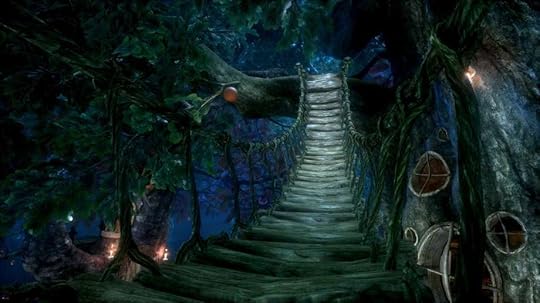Virtual Unreality

So, last night we watched Ready Player One. (I attempted to read the book as part of The Great American Read challenge at our local library, and did not get past page 100). While I’d like to think of myself as still “cool” (hopefully people still use that word to describe the state of being, otherwise my entire argument shall be moot), I found the idea of this story very, very difficult to get into.
It had nothing to do with the video gaming or virtual reality aspects, or the 1980s references. I’m a child of the 80s myself, I get most of those references. (See, I’m cool — I’m retro.) But what I struggled with was the very premise — apparently the world has finally gone to hell, the economy has tanked, the country is poverty-stricken…but everybody spends 90% of their time in an online VR world, that is supposedly offered free of charge to get started? To the general public, in a nation that now has no jobs, no GDP, evidently no trade or exports, and civilization nowhere other than…Columbus, Ohio?? Erm, o-kayyyy…
With the book, I had major issues with the narrator, too; I didn’t find him sympathetic or a kid that I could root for. I honestly found him stuck-up and arrogant, and a crude little knucklehead, and wanted him to fail. And the writing style got on my nerves; when a novel begins in a first person deep POV format, but within 10 pages strays to a journalistic-type article — including footnotes! — to explain all the background behind the VR game and why everybody wants a piece of it… Well, my eyes glazed over, and I began losing any hope of this book and I getting along.
However, that aside, I knew the rest of my household was excited about seeing the movie, and I was outvoted in that regard. Plus, last night, I was tired, and grumpy, and didn’t even feel like trying to read. I was in one of those funks, after having had a frustrating week. So, Ready Player One it was.
Now, my quibbles about the (extremely flawed and somewhat unrealistic) premise put on the back burner, the film is absolutely stunning to watch. Purely from a graphics perspective, it is eye candy art in its highest form. And I didn’t even know Simon Pegg was in it; I am utter trash for Pegg’s geek work, so once I discovered that, my mood immediately began to lift. And once you get past all the (unnecessary) info-dumping that’s in the novel, the storyline is decent.

But I had to keep forcing myself not to focus on the extremely unrealistic aspects of the setting and plot. The story is only set in 2045, which is not so far in the future that it could be entirely unrecognizable to us modern humans. The Oasis, the online server, was, according to this tale, developed and released around 2025. Less than 10 years from now, the chances of the next big tech thing coming out of anywhere other than Silicon Valley or Tokyo is downright laughable.
About 6 months ago, I watched a program on, I think it was the National Geographic channel, or one of their affiliates, about the present and future of Silicon Valley, and the CEOs for Microsoft, etc. that they interviewed announced, firmly and without doubt, that the days of nerds developing revolutionary hardware in their garages is gone. Nowadays, college students who want to become IT engineers are falling all over each other to get to New York and Los Angeles.
The novel was published in 2012, which was after Zuckerberg became one of the youngest billionaires ever by changing our world with Facebook. Microsoft and Sony and gaming companies in Japan are working really hard at making virtual reality as advanced as it was in Ready Player One. But it is expensive, and takes time, and hardworking and well-trained staff. While I’m not ruling out that someone could come up with a way to crack the barrier on their own (as happens in the story), it’s highly, highly unlikely. Also, the notion of it being a socially awkward middle-aged nerd (as the author’s tech genius is) really doesn’t seem plausible.
Since the new generation (teenagers now) have grown up with the internet and technology advancing at a consistent (almost frenetic, to some) pace, I just can’t see, in the year 2025, someone releasing a VR gaming server being utterly shocking and taking over society. The idea behind this modern fiction feels so…flimsy.

And then there are…the 80s references. I can say with a fair amount of certainty: The 80s are not considered “cool” anymore. I truly cannot envision fashions, music, or movies from that decade coming back into style. The 80s are something that make our kids look at us in confusion or roll their eyes disdainfully. Nobody gets the significance of standing outside somebody’s house holding up a boombox these days; in fact, who even knows what a “boombox” was? And that behavior is no longer viewed as an out-of-the-box way to apologize to your girlfriend; now it’s referred to as stalking.
This is one of those stories where it pays to just sit back and go along with the ride, and not dig too deep under the surface.
But that gets me wrapped in a knot, too — who exactly was the intended audience? I can’t help but wonder if Ernst Cline (the author of the novel) was aiming for an atmosphere of nostalgia, rather than near-future realism. You can’t even classify this tale as dystopia, since we’re not given enough information on the surrounding world, the government, the problems existing outside of where the narrator is immediately located. It’s so concentrated on the Oasis/VR/tech giant conspiracy motif as to be myopic.
I wouldn’t call this great fiction that’s designed to really make you think.
But it made the list of the top 100 books recommended for everyone to read at least once in their lifetime. (According to who? We haven’t figured out yet just how PBS determined what made the list and what didn’t.)

Stuff like that irks me. Sorry, folks.
And then, for all my effort, Simon Pegg was only in 20 minutes’ worth of the film. Oh, well. His performance was sterling (as he so often is).
A big component of the story does revolve around the digital world versus the real world, and I did like that the point was made: The digital world does not necessarily win out, no matter how appealing or enticing it may be. Temporarily escaping all your real life problems online does not make those problems go away; they will still be there when you log off. And the people you meet online might be very nasty in real life. Or they could be awesome — but you might never know if you don’t occasionally shut down the server.
In this age of global connectivity with the press of a button, we need to reshape our views on what makes a friendship, a community, a hobby. The world that we knew even 20 years ago is pretty much consigned to the history books. Whether that’s good or bad in the long run, we have yet to see.

But since so much of the internet and building connections across the planet could be used for good, let’s start thinking of it that way. Let’s stop being the naysayers of the future, grouching about the fact “things aren’t how they were,” and accept that life is how it is now.
Instead of ruminating over what we’ve “lost,” think about what we could gain — greater understanding of each other, more friends and colleagues and a bigger human family.
And work on maintaining the stuff we really shouldn’t lose — like respect, dignity, trust, decency, and common sense.
The biggest takeaway, I feel, of a film about virtual reality should not be that technology is the enemy. Rather, it’s how we choose to use that technology that could let us down, or build us up.

Daley Downing's Blog
- Daley Downing's profile
- 36 followers



